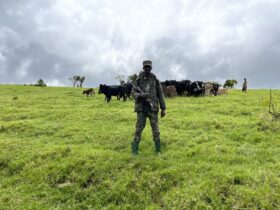The problem with writing rebuttals to western ‘Experts on Africa’, whose entire expertise lies in adding their names to new pieces that recycle their predecessor’s lies – to whom you may have already written rebuttals, is that you are forced to repeat yourself, over and over again.
The ‘expertise’ isn’t one, just a form of extortion of their own publics, all too happy to pay for exotic African stories. For us on the receiving end, it infuriates. Which is why I had ignored the New York Times’ bigoted editorial and Michaela Wrong’s empty article in the Spectator this time, pointing them to older rebuttals on my blog instead.
And now this: After ‘Stringer’, a book described by the Economist as ‘off-putting’ in an article titled ‘the Horror, the horror’, one Anjan Sundaram has just published another horror: ‘Bad News’. In the new book he imagines himself on a secret mission to protect Rwanda’s ‘Last journalist in a dictatorship’.
On page 28, he writes: ‘…the work felt rewarding. Everyday that I drew students out of the repression I was satisfied. I felt that a small part of truth had been won that day…’.
Reading the book, one needs not be a psychologist to see the author’s symptoms of paranoid schizophrenia, with a touch of ego-centrism, and while reviewing his previous book ‘Stringer’, the Economist describes him as a man who ‘appears to dread most of the Congolese he does not know and dislike many of those he does’, with the self-imposed ‘aim of rescuing [the Country] from obscurity’.
The Economist further highlights that his ‘writings have some unmistakable hallmarks: a nervous oscillation between fear and fascination with the country and its people; a gnawing suspicion that they may be cursed, evil or mad’.
In the new book, this time about Rwanda, he didn’t disappoint. He engages in peculiar depictions of himself as a time traveler, waiting for some biblical appearance. He imagines President Kagame as his direct interlocutor in rallies, eager to ‘demonstrate his power’ directly to him. That the president likely ignores up to his very existence, is out of the question of course…
Following Makau Mutua’s ‘Victims, Savages and Saviors’ metaphor, the author typically paints President Paul Kagame and his government as ‘Savages’ finding pleasure in oppressing their own people, whom are powerless ‘Victims’ of a dictatorship, waiting for ‘Saviors’ from the ‘West’ – such as himself – to help them. “We want three things, peace, freedom and democracy; give them to me and I’ll be happy”, one of his characters begs of him on Page 65.
As is his style, right from the start, Sundaram forfeits reason, so he can workout the most insane of scenarios, totally untethered. He declares Rwanda to be a dictatorship and projects himself as James Bond, risking his life daily to train journalists to be critics of Paul Kagame the dictator.
He paints the government as a kind of force of darkness, and local leaders as angels of evil: ‘A local official emerged out of a roofless mud hut… they could be most dangerous; most loyal to the government’.
Good World Bank and World Health Organization policies are described in the book as dictatorial directives; decentralization policies as control mechanisms and land consolidation, modern farming – as ‘populations relocation’: ‘slippers were worn overnight and plastic bags suddenly eradicated! All those are signs of control…’ he claims.
He doesn’t stop there. He describes traffic lights as ostentatious, pavements as spaces laid to spy on people who walk on them, while assuring readers that Kigali’s streets are all deserted, as ‘people prefer hidden roads away from the government’s eye’.
He describes life in Rwanda, as more miserable than in Emile Zola’s ‘Germinal’: ‘All huts were roofless, people in the dark, stuffed in with goats and pigs; a child heaves, lying on a straw bed among animals, sweating. Over his face were broken out blisters, jagged little lumps; too many children in the same condition; a whole village…’ He makes no mention of the Universal healthcare, Free education, One cow per poor family, or the One computer per child, all existing government initiatives
‘News was empty’, he regrets. ‘There was no bad news’ in Rwanda; ‘Professional [western] propagandists couldn’t find work here…’ – so, he writes ‘Bad News’ to create some work for western propagandists – a profession I didn’t know existed until I read the book.
In a country he describes as closed and unsafe, where speech is muzzled, it is uncanny how he seems to attract a sudden urge from people to talk to him and worry about his safety within seconds of their encounters. The same people who would rather not give the same accounts to UN and World Bank researchers…
The moment one decides that the truth doesn’t count, there is nothing one can do, And Sundaram readily frees himself from the burden of the truth, preferring to use his fertile imagination. At one point he invents; laws against laughing at others in Rwanda…’, and imagines scenes where ‘People gather around the photograph of the president and pray to him’.
Some of his students follow his advice and go as far as publishing pictures of Rwanda’s president with a Hitler mustache, or Juxtaposing him with the Swastika symbol – to all he promises sanctuary in the west. Others resist him, though. He confesses to harassing Agnes, one of his students, for reporting good news about the government, “Until she stopped coming to class…” Perhaps she actually realized, as he confesses later on, ‘this man has nothing to teach me’ Reading the book one wonders if that is the role of a teacher of journalism, to teach journalists what to think? Also, one wonders which qualifications does him have to teach journalism?
All this is funny, until he drifts into unsavory insensitivity: ‘They are selling the genocide….’, he whines, repeatedly. He then describes a genocide commemoration event as an absurd scene, all told in the most despicable of words, which I can’t really repeat here. Now this part is illegal, It violates international law and I will come back to that.
The book is desperately wanting in evidence. As is rather common of experts on Rwanda. So he does what they all do: make things up or speak in abstract terms; going: ‘The way people talked, something in their mannerism, you could sense repression’. Having done a whole course on the effects of torture and violence in school and talked to genocide survivors, let me just say: There is no such thing as a mental feeling of repression. One doesn’t sense repression; they physically experience it – but we are in the realm of ferry-tale here, everything is imagined…
But I think the book’s timing was most unlucky, as it coincided with United Nations’ reports that Rwanda registered the highest Human Development in the last 25 years globally; that it is one of the fastest growing economies worldwide, and that Kigali is the safest place to walk at night. To that he claims both the UN and the World Bank serve at Kagame’s pleasure: ‘The government forced the UN to distance itself from the study and blacklist researchers; forced the World Bank to destroy its data’, he alleges.
At some point he comes around to the gist of his book: ‘I was at a diplomatic event where the European parliament pledged to give to the Rwandan government 300 million’. I really like what follows: ‘when a representative of the Rwandan government took the stage, he did not thank the Europeans! Instead he read a letter from the Minister saying she appreciated that the world had finally realized that the government was capable of overseeing its own finances, resources and people’.
Here he is sending a message to his clients: ‘We’ give Rwandans money and they aren’t even grateful. Well, don’t worry about it, Sundaram; we take no pride in receiving donations from you, in the same way we don’t take any pride having been stolen from, in the first place…
Some people like famous Economist John Nash, use their brilliance to enlighten society. Other, like Hitler use theirs to mislead it so they can extract as much as possible from it.
I bring up these two characters because I couldn’t help thinking about the film ‘A Beautiful Mind’ with Russell Crowe playing John Nash, who incidentally was suffering from paranoid schizophrenia but still used his genius for the good of mankind. And Hitler who, suffering from the same condition, used his to preside over a holocaust.
Sundaram presents the same attributes as there two men, sadly he has chosen to use his brilliance to bring ‘Meine schlechte Nachricht’ (My Bad News) to the world. First it was DRC. Now it is Rwanda. God knows where next.
That space in a leading British newspaper is availed for his trash speaks volumes about the publication’s integrity and motives. But then again, when it comes to Rwanda, it seems, anything goes…
Recognizing himself in the book as ‘Moses’, one of its main characters, Rwandan Journalist Sam Gody Nshimiyimana, expresses his astonishment in an article published in Rwanda Focus, a local newspaper, and distances himself from Sundaram’s ‘utter lies’.
This story isn’t finished, it won’t stop there, we can’t just stop at writing rebuttals in local papers as people come here, insult us, and negate the genocide. They should not get away with it. Fortunately the world has changed. We Africans should be able to sue this type of authors and help those coming after them to think first before they write this type of insensitive nonsense. Had we read ‘Stringer’ from DRC before, we wouldn’t have even spoken to this man..
Author and Journalist Christopher Hitchens once said: ‘Everybody does have a book in them, but in most cases that’s where it should stay.’ This one should have definitely stayed in Sundaram’s deceitful mind, sadly it speaks to a certain clientele, and creates jobs for the people he calls: ‘professional propagandists’















Leave a Reply